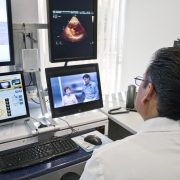Private markets have a way of developing and testing innovative new solutions to people’s problems, without resort to government or other forms of dependency. In fact, self-efficacy is a pathway to eliminate personal dependence. Whatever the problem people need solving, private enterprise is the best way to discover a solution, through collaboration, experimentation and feedback loops. This article is taken from The Wall Street Journal. We edited out some names.
_________________________________________________________________________________
Emily Brawn is a recovering opioid user who is trying a new strategy. In early September, 90 days sober, the 29-year-old stepped into a gym in an industrial corner of Boston, where muscled people were warming up for CrossFit, surrounded by top-line equipment and a rock-climbing wall.
But this gym is different: It is free and its patrons are beating back drug addictions. The staff’s black T-shirts are emblazoned with celebratory statements about sobriety.
“Most of us are in recovery ourselves,” Kina Troy, a front-counter employee, told Ms. Brawn.
The nearly 11,000-square-foot gym is part of “The Phoenix,” a Denver-based string of fitness centers and programs for recovering drug abusers. It is spreading nationally with the help of management coaching and a multimillion-dollar investment from an arm of a private donor network.
Venture Capital Meets Philanthropy Meets Research Meets Innovation.
A venture-philanthropy group called Stand Together is investing more than $40 million this year in nonprofits, including between $2 million and $3 million in the Phoenix. It expects to continue or increase that level of funding to the Phoenix in future years, said Stand Together Executive Director Evan Feinberg.
Advocates, officials and philanthropists are scouring for any tactic to stop deaths from the still metastasizing opioid crisis. That includes seeking new ways to thwart potentially deadly relapses. Preliminary U.S. Centers for Disease Control and Prevention data show drug-overdose deaths topped 70,000 last year, up more than 10% from the previous year, driven by opioid fatalities.
Increasingly, evidence supports exercise as a tool to stay sober, said Peter Thanos, an addiction researcher at the University of Buffalo. Steady exercise can regulate brain circuitry linked to feelings of well-being, he said. Addictive drugs “hijack” that reward system but dull it over time, he said, prompting addicts to chase greater highs to feel normal.
“In theory, you should be able to have an effect on drug-seeking” through persistent exercise, Mr. Thanos said.
The Phoenix, now in 11 states and set to move into Florida in October, could expand to every state, Stand Together officials said.
In Dallas, donor Arun Agarwal bought a building that will open as a 7,500-square-foot Phoenix gym early next year. He watched two employees at his textile company wrestle with painkiller addictions. He said he paid for their treatment, but they repeatedly relapsed, despite desperately wanting to stay sober. “It was an eye opener,” he said.
Even before the ACA, Medicaid was the largest source of funding in the U.S. for mental-health care, including substance-abuse treatment, according to the Robert Wood Johnson Foundation. But addiction is a multifaceted problem and it is a mistake to think needs won’t be met “if government isn’t expanding.”
“While a private market philosophy and strategy on some of the issues may not be things that I am perfectly aligned to, nevertheless we’re saving lives,” said Jacquelyn Hillios, Phoenix’s deputy executive director. Her own political leanings, as a social worker, she said, “don’t get much more liberal.”
Self-efficacy: The Belief That You Can Do What You Set Out To Do.
Scott Strode, who founded the Phoenix 11 years ago, credits physical exertion with fueling his long-running abstinence from alcohol and cocaine. A self-described “big bald guy” with bulging muscles, he said the concept is simple: a sober social network where anyone who is clean for 48 hours can realize their potential through physical fitness.
Phoenix activities, from rock climbing to mountain biking, are specifically chosen to increase self-efficacy, the belief that you can accomplish what you set out to do.
People are “so fearful of a relapse that they are locked up at home trying to figure out who they are sober,” said Mr. Strode, who is 45. “I really found out who I was by crossing the finish lines and climbing mountains.”
Phoenix’s Boston gym, which also started with help from local donors, is around the corner from a stretch of road known as “Methadone Mile.” People sleep along a chain-link fence and use drugs near treatment and social-service centers. Discarded needle caps dot the pavement.
Massachusetts opioid-related deaths are trending lower but remain alarming, with more than 2,000 last year, according to estimates.
Phoenix staffers walk the rough area inviting people to try the gym, which is offering classes such as yoga. They plan an official grand opening on Sept. 29.
Dina Gonsalves, who is 51 and manages a Boston pizza shop, credits CrossFit at Phoenix and methadone for helping her recently hit a year of sobriety from heroin.
“Within two months, my body transformed,” she said, flexing an impressive biceps. “I was hooked—kind of like another addiction, but a positive one.”
This article was originally published at wsjonline Sept 17, 2018
Write to Jennifer Levitz at jennifer.levitz@wsj.com
PHOTO: PHOTO BY KATHERINE TAYLOR FOR THE WALL STREET JOURNAL













